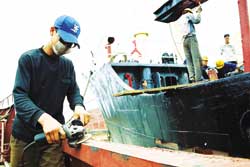PM Dung pours cold water on SOEs’ banking ambitions
 SOEs should concentrate on what they know best |
“No company can rule a bank in this country. All banks will be socialised for the demands of economic development,” said Dung at a meeting in Hanoi last week. He said domestic corporations and groups had to review their banking plans and focus on their core businesses. He said banking was not a sector for state-owned firms which operate in the industrial, technology and construction sectors.
Banking has been growing quickly and attracted the attention of groups such as Electricity of Vietnam, Vietnam National Oil and Gas Group, Vietnam National Coal and Mineral Industries Group and FPT Group. Meanwhile, the government has agreed in principle to establish nine joint stock commercial banks.
Decision No 24/2007/QD-NHNN regulating the licence for joint stock commercial banks dated June 7, 2007, stipulates that an institutional shareholder can hold up to 20 per cent chartered capital but it can only buy into one bank. However, domestic companies are asking for permission to buy between 40-50 per cent stakes.
“You can take part in the establishment of a joint stock bank but will only be allowed to hold 15 per cent. If you want 20 per cent, you need prime ministerial approval,” said Dung.
Vo Hong Phuc, Minister of Planning and Investment, said: “State-owned corporations and groups can only get the highest business effectiveness if they do business in the fields relating to their main sector. Meanwhile, they are special in the industry and trade fields, dissimilar to finance and banking.”
Jonathan Pincus, chief economist of United Nations Development Programme in Vietnam, said big state-run firms establishing banks was a worrying sign. “A bank cannot be owned by one company or even two companies. A bank has to be owned by many companies to ensure that no one can dominate or manipulate it,” he said.
Pincus said that it would be possible to bring in capital from the public and then lend it out to members of the groups. This could lead to latent risks, as the loans may not meet the requirements on risk management. “This could lead to bankruptcies and a collapse of the country’s financial system. That is very dangerous indeed,” said Pincus.
What the stars mean:
★ Poor ★ ★ Promising ★★★ Good ★★★★ Very good ★★★★★ Exceptional
Latest News
More News
- Cashless payments hit 28 times GDP in 2025 (February 04, 2026 | 18:09)
- SSIAM and DBJ launch Japan Vietnam Capital Fund (February 04, 2026 | 15:57)
- Banks target stronger profits, credit growth in 2026 (February 04, 2026 | 15:43)
- Vietnam on path to investment-grade rating (February 03, 2026 | 13:07)
- Consumer finance sector posts sharp profit growth (February 03, 2026 | 13:05)
- Insurance market building the next chapter of protection (February 02, 2026 | 11:16)
- NAB Innovation Centre underscores Vietnam’s appeal for tech investment (January 30, 2026 | 11:16)
- Vietnam strengthens public debt management with World Bank and IMF (January 30, 2026 | 11:00)
- Corporate bond market poised for stronger growth cycle (January 28, 2026 | 17:13)
- Vietnam's IPO market on recovery trajectory (January 28, 2026 | 17:04)
















 Mobile Version
Mobile Version